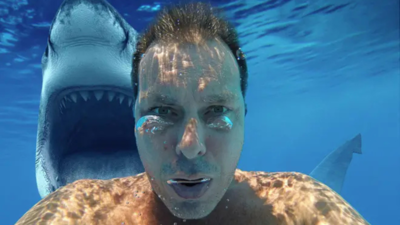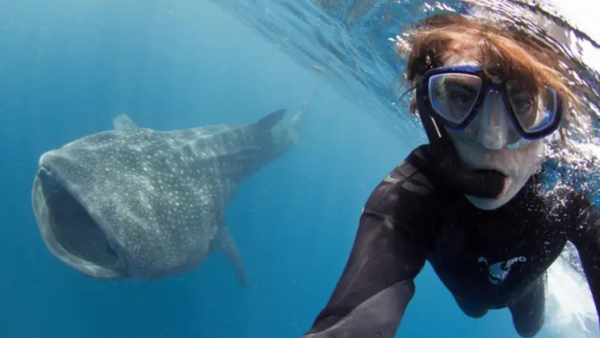
The pursuit of the perfect selfie has evolved beyond a harmless hobby and is now a dangerous trend in the oceans. Scientists are warning that the rising number of
shark attacks
can be attributed to tourists and influencers eager to capture close-up moments with these powerful predators. These reckless encounters, often driven by the desire to photograph or film, are leading to risky situations. A growing number of shark attacks are actually defensive responses by sharks, triggered by human behavior such as poking, prodding, or trying to photograph them. As the
selfie craze
intensifies, scientists urge people to reconsider the risks and treat these apex predators with the caution they require.
How is the selfie craze leading to more shark attacks
A new study published in Frontiers in Conservation reveals that many shark bites previously labelled as "attacks" are actually defensive reactions. Sharks are typically non-aggressive toward humans. They respond instinctively when they feel threatened, often after being poked, prodded, or grabbed by individuals trying to take photos or videos.
Social media’s role in fueling risky behaviour around sharks
"People are treating sharks without any caution, in ways they would never treat a strange dog," says Professor Eric Clua of Paris Sciences et Lettres (PSL) University, the study’s lead author. "Many influencers encourage clinging to a shark’s dorsal fin or stroking them under the false idea that they are harmless. But this behaviour provokes the animal’s survival instincts."

Image source: Alamy
What does the study reveals
The study examined shark encounters in French Polynesia from 2009 to 2023. Out of 74 recorded bites, about 5% were found to be defensive, occurring immediately after humans behaved aggressively or intrusively toward the shark. Most incidents involved smaller species like grey reef sharks, lemon sharks, blacktip reef sharks, and nurse sharks.
What role are influencers playing in shark-human conflicts
This trend is fueled by viral social media content, where influencers and even celebrities showcase themselves swimming beside or touching sharks. Wildlife photographer Taylor Cunningham, for example, shared videos of herself touching tiger sharks, calling them "like family." Meanwhile, marine biologist Ocean Ramsey sparked controversy after being filmed swimming alongside and stroking a giant great white shark, Deep Blue.
Recent examples of shark bites
These seemingly awe-inspiring moments come with real consequences. Recently, a Canadian tourist lost both her hands and part of her thigh while trying to photograph a shark in the Turks and Caicos Islands. In another tragic case, Barak Tzach, a father of four, was killed by sharks while attempting to film them off the coast of Israel.
Misconceptions about sharks vs. the reality of their behaviour
Experts emphasise that shark bites are extremely rare compared to other risks — sharks are responsible for fewer than 10 deaths a year globally, while dogs cause over 10,000 fatalities annually. Yet sharks suffer from a strong negative public image, leading to fear and misunderstanding.
"Enjoy the beauty of sharks, but remember: they are wild predators," warns Professor Clua. "Look, don’t touch."
What can be done to prevent future shark bites
The message is clear. As the obsession with capturing sensational content grows, so does the risk, not just to humans, but to the sharks themselves. Scientists hope that by highlighting the real causes behind many of these incidents, people will rethink their approach to interacting with wildlife.
In the end, the best selfie might be the one taken from a safe distance, respecting the majestic creatures we are so eager to capture.

 1 month ago
172
1 month ago
172




























 English (US)
English (US)